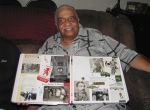Before Harry Rideout, former field supervisor for the Pittsburgh Public Schools, was keeping order in the schools, he was fighting for freedom and protecting his country in the military during a time when most Blacks could not even go to the same establishments as their White counterparts. For more than 20 years he served in the military, fighting in World War II and the Korean and Vietnam wars.
 |
| LEGACY—Veteran Harry Rideout shares his photos and memorabilia of his time in the military and his service in three wars.
|
Rideout, 83, was born in the Charleroi area of Pittsburgh and grew up in Beltzhoover. He volunteered with the army at the age of 17, was sworn in at 18 and was one of five brothers who also served in the military.
“I enjoyed my time in the service. During my time in the wars, I was never really worried about anything,“ Rideout said. Although there was a lot of discrimination and unfair treatment of Blacks, Rideout said he enjoyed what he was doing. “There were many disparities of Blacks. We (were not liked) but we were always the first on the front line,” he said.
Rideout’s military career began when he was stationed in Virginia and from there was sent to the Philippines with the 93rd Division, one of only two Black divisions, during World War II.
“I was one of five brothers serving in the South Pacific at the same time during World War II. Our mother was so proud,” Rideout said. During that time, when a mother would have a child in the service, she was known as having a gold star. “Our mother had the most gold stars in our neighborhood.”
During his time in the service, he dealt with logistics and supplies, which entailed ordering supplies and issuing them to the soldiers. He said during World War II, it took 11 service men to get one front line soldier all the supplies he needed.
After World War II, Rideout was sent to Japan. He said a couple days after he left, the Korean War began. He spent 19 months in Korea. And for the last six months of his tour he wrote and directed a variety show that toured to Advance Bases.
“You always had to be alert and cautious, but during the Korean War, you had to be extra careful because you didn’t always know who the enemy was. In the daytime he could be working with you and at night he could be shooting you,” he said of the Koreans. “You did not trust anyone but your own comrades.”
After the Korean War, Rideout was stationed in New York at Fort Totten. He remembered a time, four years after President Harry S. Truman signed the desegregation of the armed forces law in 1948, he went to a base and was not allowed to stay in the barracks. He had to get a hotel room for the evening and was transferred. “They did not want Blacks and made it quite clear,” Rideout said it was not until the ’60s, when the military was fully integrated, that conditions and treatment got better.
Rideout stayed in New York until he received orders to go to Germany, where he stayed until he was transferred to Vietnam in 1966.
“Although I fought in the war, I did not believe in it. I thought it was a waste of manpower and financial resources.”
He spent 14 months in Vietnam and was then transferred to Fort Dix in New Jersey and then the University of Scranton where he was a logistic coordinator and instructor of their ROTC program. In the evening Rideout would take courses in law enforcement.
After he retired from the military in 1969, he worked for 20 years as a field supervisor for the Safety Division of the Pittsburgh Public School District, under his brother, Stanley Rideout, who was the chief of police for the Pittsburgh Public Schools.
“It was during a time when the racial tone was high. It was rough with the bussing of Blacks,” he said.
He also volunteered for 20 years as the manager of the Walter Robinson American Legion Post 450 in Sewickley.
Now Rideout enjoys his time with his wife of 57 years, Elizabeth Ann Mouchett, whom he met while stationed in New York, his daughter and his soon to be born grandchildren, who are triplets.
Rideout said although there is danger in the military, like anything in life, he would recommend it because there are valuable life skills to be learned such as discipline and people skills.
And he advises all young Black men and women in the military to further their education. “Get your education. Take everything they (the military) offer and ask for more. Do not leave the service without an education or a trade,” Rideout said. “Educations are what are going to get us through. If you feel you are not college material, then learn a trade.”